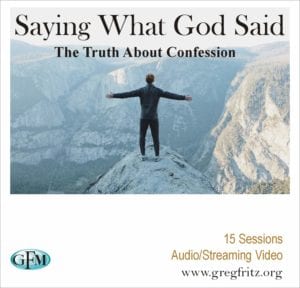One of the best examples of the benefits of our confessions of faith and the high cost of unbelief is in Numbers 13-14. This incident with the Israelites highlights the importance of our words more than any other in the Bible.
God wanted them to take the land He had promised to Abraham and his descendants 400 years before. They all knew the promises, and they had grown up knowing it was God’s will to give them that land. They had heard God’s Word on the matter.
Moses sent twelve spies to check out the land before they invaded. Among these were Joshua and Caleb, the only ones named and remembered and the only ones who believed. Upon returning from their mission, the twelve began to give their report.
“Then they told him, and said: ‘We went to the land where you sent us. It truly flows with milk and honey, and this is its fruit. Nevertheless the people who dwell in the land are strong; the cities are fortified and very large; moreover we saw the descendants of Anak there.’” —Numbers 13:27-28
“But the men who had gone up with him said, ‘We are not able to go up against the people, for they are stronger than we’… saying, ‘The land through which we have gone as spies is a land that devours its inhabitants, and all the people whom we saw in it are men of great stature. There we saw the giants (the descendants of Anak came from the giants); and we were like grasshoppers in our own sight, and so we were in their sight.’” — Numbers 13:31-33
“So all the congregation lifted up their voices and cried, and the people wept that night. And all the children of Israel complained against Moses and Aaron, and the whole congregation said to them, ‘If only we had died in the land of Egypt! Or if only we had died in this wilderness!’” — Numbers 14:1-2
Notice the bolded words. All they did that day was talk, talk and talk. They were just being honest with each other. Did it really matter what they said?
Their words disagreed with God’s Word, and it mattered what they said. In fact, it’s the only thing that mattered that day. Hebrews calls what they did unbelief, and it cost them their destiny:
“So we see that they could not enter in because of unbelief.” —Hebrews 3:19
If you want to see (or hear) unbelief, just read the scriptures above again. They were being factual and honest about what they saw. It appeared they were outnumbered and out-gunned. The problem is, when what you see disagrees with what God said, it is unbelief for you to say it.
“Then Caleb quieted the people before Moses, and said, ‘Let us go up at once and take possession, for we are well able to overcome it.’”—Numbers 13:30
Joshua and Caleb, “spoke to all the congregation of the children of Israel, saying: ‘The land we passed through to spy out is an exceedingly good land. If the Lord delights in us, then He will bring us into this land and give it to us, a land which flows with milk and honey. Only do not rebel against the Lord, nor fear the people of the land, for they are our bread; their protection has departed from them, and the Lord is with us. Do not fear them.’” —Numbers 14:7-9
Finally, God said in Numbers 14:28, “Say to them, ‘As I live,’ says the Lord, ‘just as you have spoken in My hearing, so I will do to you….’” We know that Joshua and Caleb were the only ones from that generation allowed to go into the Promised Land 40 years later.
Joshua and Caleb got what they said.
The rest got what they said, and you and I get what we say. There are Bible examples too numerous to mention that prove this point.
After seeing for myself what the Bible had to say on the importance of the words we speak, not only was I convinced the faith teachers were right about confession, I became a faith teacher myself!
I have seen firsthand how faith in God’s Word has changed my life!


